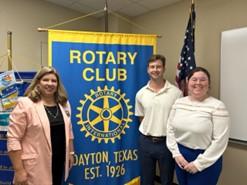Dayton Rotary News
The Dayton Rotary Club met last week. They are planning their upcoming Annual All-You- Can- Eat Fish Fry, which will be held on Oct. 27 at the cafeteria of Wilson Jr. High-309 S. Hwy 146. Tickets will be $ 14 and can be purchased through any of the Rotarians and can be bought at the door the evening of the event. The Fish Fry will start at 4:00- 7:00 (or until sold out). The funds raised will benefit the Dayton Rotary Club Scholarships that are given out to deserving seniors every year. Dr. Jessica Johnson, Rotarian encouraged folks to come out and eat then attend the Bronco game. In the pregame that night, the Sports Hall of Fame Inductees will be announced prior to the Varsity game at Bronco Stadium.
Rotarian Tami Pierce introduced the program of the day. Shawn Waldron, Director, Legal and Government Affairs of HBW Resources talked about the new company Verde CO2 that is around the Devers area. Verde CO2 is a full- service carbon capture and storage (CCS) development company that is focused on decarbonizing large industrial carbon dioxide emissions. They have held two open houses, one in Devers at the Devers ISD cafeteria and the other at the Dayton Community Center and are planning another upcoming open house later this year.
According to the presentation and handout from Verde CO2, “ the CCS is the process of removing carbon dioxide emissions from large industrial plants before they reach the atmosphere and transports the captured emissions for storage deep underground. Waldron stated that the CCS significantly reduces emissions that contribute to individual health risks of population living near emissions sources, while creating and maintaining various jobs and other economic benefits to the local communities.” When asked how the Verde’s Project benefit Liberty County, the representative cited that “ long- term investments in carbon- reducing technology will help Verde’s projects decrease the overall emissions that plague the Texas Gulf Coast and their communities.
Shawn Waldron discussed with the Club how the carbon storage sites are selected. “Geologists conduct rigorous analyses that help mitigate the risk of the carbon migrating to other formations or to the atmosphere. The carbon is also stored deep underground and far below any sources of drinking water. Sites along the Gulf Coast have been found to be well-suited for carbon storage because the particular geologic formations that are prevalent there have the greatest potential for safe, permanent storage.” At the conclusion of the presentation, the Rotary Club members had several questions and then they adjourned with the 4-Way Test led by President Ann Marie Mitchell.

